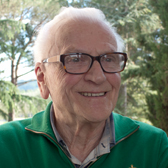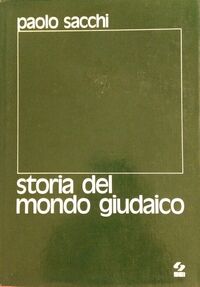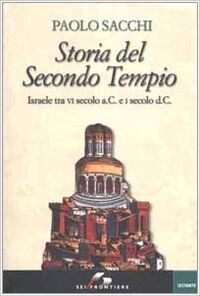Paolo Sacchi (M / Italy, 1930), scholar
Revision as of 15:56, 5 December 2021 by Gabriele Boccaccini (talk | contribs)
File:1971 Sacchi.jpg
1971
File:1990 Sacchi.jpg
1990
File:1996 Sacchi.jpg
1994 <English ed.>
Paolo Sacchi (b.1930) is an Italian scholar, professor of Hebrew and Aramaic at the University of Turin, Italy, founder in 1979 of the journal Henoch, and the leading Italian specialist in Second Temple Judaism of his generation.
-- 1950s --
Paolo Sacchi, Alle origini del Nuovo Testamento (Florence, Italy: Le Monnier, 1956)
-- 1970s --
Paolo Sacchi, Ecclesiaste (Nuovissima versione della Bibbia dai testi originali, 20; Rome [Italy]: Paoline, 1971)
- Italian translation of Qoheleth, with introduction and commentary.
Paolo Sacchi, Storia del mondo giudaico (Turin, Italy: SEI, 1976)
-- 1990s --
Paolo Sacchi, L’apocalittica giudaica e la sua storia (Brescia, Italy: Paideia Editrice, 1990)
- "L'apocalittica: una nebulosa dagli spessori variabili, una matassa ingarbugliata. Verità che distruggono, segreti terribili trasmessi dal mondo degli angeli a quello degli uomini; peccati mostruosi fra cielo e terra; lotta cosmica tra demoni e angeli; coscienza della fragilità dell'uomo e della sua grandezza, del suo posto nel dramma della vita e della storia. Paolo Sacchi, messo da parte ogni tentativo di definizione preliminare dell'apocalittica, ha cercato di penetrare la nebulosa, di afferrare un capo della matassa. Mettendo a frutto recenti scoperte che mostrano come il cosiddetto Libro dei Vigilanti, solitamente considerato apocalittico, sia più antico degli altri scritti del genere, ha cominciato con lo studiare quest'opera trovando che essa sta a monte di una corrente di pensiero di grande importanza in Israele, se suoi elementi divennero pangiudaici e altri poterono trasfondersi nell'essenismo e nel cristianesimo. Paolo Sacchi, ordinario di Ebraico e aramaico all'Università di Torino, si è sempre più dedicato allo studio di quel periodo della storia giudaica che vide fiorire varie forme di giudaismo, una delle quali fu il cristianesimo. Autore di numerose opere (Alle origini del Nuovo Testamento, Firenze 1956; Qoelet, Roma 1971, 1986; Storia del mondo giudaico, Torino 1976; Apocrifi dell'Antico Testamento, curatore e in parte autore, voll. I e II, Torino 1981 e 1989), per le edizioni Paideia dirige i "Testi del Vicino Oriente antico".--Publisher description
- Series : Biblioteca di cultura religiosa.
- Translations : English (1996).
Paolo Sacchi, Storia del Secondo Tempio (Turin, Italy: SEI, 1994)
- "E' una storia di Israele che parte dall'esilio babilonese per concludersi con la distruzione del Tempio (70 d.C.). Il saggio privilegia il periodo in cui la Bibbia ha preso la forma attuale e nel quale si sono sviluppate nel mondo ebraico numerose tendenze in polemica fra loro fino alla nascita del cristinesimo. L'autore intreccia la narrazione storica con le dimensioni religioso-culturali di volta in volta caratteristiche di un'epoca e gravide di conseguenze per le generazioni successive."--Publisher description.
- Translations : English (2000) -- Spanish (2004)
The History of the Second Temple Period (2000 Sacchi), book (English ed.) Historia del judaísmo en la época del Segundo Templo (2004 Sacchi), book (Spanish ed.)
English ed. <L'apocalittica giudaica> : Paolo Sacchi, Jewish Apocalyptic and Its History, tr. William J. Short (Sheffield [England]: Sheffield Academic Press, 1996)
- Series : Journal for the Study of the Pseudepigrapha Supplement Series, 20.
- "This translation of L'apocalittica giudaica e la sua storia makes Professor Sacchi's innovative thesis on Jewish apocalyptic available to a wider, English-reading audience. Sacchi argues that the term 'apocalyptic' is a modern invention, deriving from the wish to conceptualize the field of research on the affinities between the Apocalypse of John and other works of its time. These affinities do not just relate to literary character and form but also in part to content. Focusing on the material of 'Enoch' Sacchi concludes that what is needed is a more precise, literary and historical definition of 'apocalyptic'."--Publisher description.
-- 2000s --
Paolo Sacchi, The History of the Second Temple Period (2000 Sacchi), book (English ed.)
- "One of the first major modern studies to explore the second temple period in its entirety, Sacchi’s history (actually beginning from the death of Josiah in 609 BCE and the events leading up to the exile) sets out to place pre-Christian Jewish concepts in the proper context in order to better understand the earliest positions of Christianity. The book is divided into two major sections – the first is Sacchi’s chronological history of the events of the period; the second is his intellectual history based around theme rather than chronology. Sacchi’s fondness for intellectual history is seen in the first section as well, where he often will follow his strict chronology of events with a discussion of the cultural/political ideas which shaped or were shaped by these events, viewing the history of the period through the lens of socio-political struggles for positions of power and authority within the Jewish community. The second section dealing with the themes of “Middle Judaism,” borrowing the term from Gabriele Boccaccini, Sacchi here focuses on the major ideological issues of the post-Zadokite period (200/175 BCE – 70 CE), stressing those movements and those issues which were more relevant to the formation of early Christian thought, issues such as the theodicy, soteriology, and messianism. In making the move from a chronological to a thematic approach Sacchi acknowledges the difficulty in dating most of these texts with any degree of certainty and therefore the difficulty in attaching ideological themes to known historical events. This thematic approach fits well with Sacchi’s goal of situating early Christian thought in a milieu dominated by new and unique concepts developed to deal with common theological problems. A major strength of Sacchi’s approach is in his treatment of each text in its own terms, completely removed from standard theological and modern academic corpora." – Jason Zurawski, University of Michigan
Paolo Sacchi, Gesù e la sua gente (2003 Sacchi), book
Paolo Sacchi, Historia del judaísmo en la época del Segundo Templo (2004 Sacchi), book (Spanish ed.)
Paolo Sacchi, Regola della Comunità (2006 Sacchi), book
Paolo Sacchi, Sacro/profano impuro/puro nella Bibbia e dintorni (2007 Sacchi), book
-- 2010s --
Paolo Sacchi, Tra giudaismo e cristianesimo: riflessioni sul giudaismo antico e medio (2010 Sacchi), book
Paolo Sacchi, Introduzione agli apocrifi dell'Antico Testamento (2011 Sacchi), book
Paolo Sacchi, Antico Testamento, apocrifi e Nuovo Testamento. Un viaggio autobiografico (2015 Sacchi), book
Paolo Sacchi, Storia del Secondo Tempio, 2nd ed. (2019 @1994 Sacchi / Mazzinghi), book
- "Per l'Israele antico, il periodo compreso tra VI secolo a.C. e I d.C. ― tra la distruzione del primo Tempio di Gerusalemme da parte di Nabucodonosor e quella del secondo, ricostruito, da parte di Tito ― fu cruciale: la Bibbia assunse la forma che conosciamo e, nel giudaismo, vennero sviluppandosi rabbinismo e cristianesimo. A partire dagli scritti canonici, dagli apocrifi e dai testi qumranici, Paolo Sacchi ne propone una storia, a impianto soprattutto tematico, in cui la narrazione storico-politica si intreccia alle dimensioni religioso-culturali di volta in volta caratteristiche di un'epoca e gravide di conseguenze per le successive."--Publisher description.
Edited volumes
==== Paolo Sacchi, Apocrifi dell'Antico Testamento (1981-2000 Sacchi), edited volume ==== Paolo Sacchi, Il giudaismo palestinese, dal I secolo a.C. al I secolo d.C. (1993 Sacchi), edited volume ==== Paolo Sacchi, Indice concettuale del medio giudaismo (2000- Sacchi), edited volume
Articles in edited volumes
- Recovering Jesus' Formative Background / Paolo Sacchi / Jesus and the Dead Sea Scrolls (1992 Charlesworth), edited volume
- History of the Earliest Enochic Texts / Paolo Sacchi / Enoch and Qumran Origins (2005 Boccaccini), edited volume
- Le figure messianiche superumane del Secondo Tempio e il figlio dell'uomo / Paolo Sacchi / Il messia tra memoria e attesa (2005 Boccaccini), edited volume
- The 2005 Camaldoli Seminar on the Parables of Enoch: Summary and Prospects for Future Research / Paolo Sacchi / Enoch and the Messiah Son of Man (2007 Boccaccini), edited volume
- Figure superumane e attesa messianica fra il II secolo a.C. e I secolo d.C. | Paolo Sacchi | Gesù e i Messia di Israele (2006 Guida/Vitelli), edited volume
Articles in academic journals (selected)
- Il problema degli anni 390 nel Documento di Damasco I:5-6 (1964 Sacchi), essay
- Il Rotolo A di Isaia: problemi di storia del testo (1965 Sacchi), essay
- Il "Libro dei Vigilanti" e l’apocalittica / Paolo Sacchi / Henoch 1 (1979) 42-98
- Ordine cosmico e prospettiva ultraterrena nel postesilio: il problema del male e l’origine dell’apocalittica / Paolo Sacchi / Rivista Biblica 30.1 (1982) 11-33
- Qumran e la datazione del Libro delle Parabole di Enoc (Qumran and the Dating of the Book of Parables / 2003 Sacchi), essay
External links
- Wikipedia.en -- Wikipedia.de -- Wikipedia.fr -- Wikipedia.it -- Wikipedia.es


